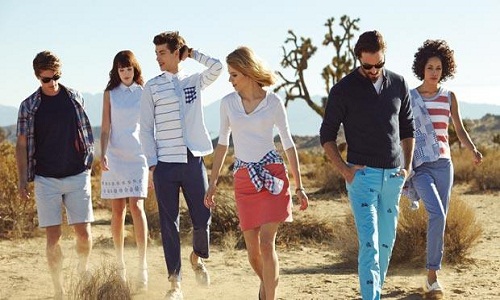"A recent report suggests ‘Made in US’ clothing is gaining ground with the government’s thrust and companies’ near-shoring strategies. The focus is on high-quality US craftsmanship priced competitively with imports. This proposition makes perfect sense for manufacturers and sellers as the entire supply chain is in their hands rather than depending on the external factors. These increasingly growing state of affairs is giving rise to ‘grown and sewn in the US’ phenomenon, where e-commerce lets small firms tell a story and sell directly to consumers who have an interest in natural fibres such as cotton and wool, a willingness to invest in longer-lasting higher-quality goods and a desire to shop local."
 A recent report suggests ‘Made in US’ clothing is gaining ground with the government’s thrust and companies’ near-shoring strategies. The focus is on high-quality US craftsmanship priced competitively with imports. This proposition makes perfect sense for manufacturers and sellers as the entire supply chain is in their hands rather than depending on the external factors. These increasingly growing state of affairs is giving rise to ‘grown and sewn in the US’ phenomenon, where e-commerce lets small firms tell a story and sell directly to consumers who have an interest in natural fibres such as cotton and wool, a willingness to invest in longer-lasting higher-quality goods and a desire to shop local.
A recent report suggests ‘Made in US’ clothing is gaining ground with the government’s thrust and companies’ near-shoring strategies. The focus is on high-quality US craftsmanship priced competitively with imports. This proposition makes perfect sense for manufacturers and sellers as the entire supply chain is in their hands rather than depending on the external factors. These increasingly growing state of affairs is giving rise to ‘grown and sewn in the US’ phenomenon, where e-commerce lets small firms tell a story and sell directly to consumers who have an interest in natural fibres such as cotton and wool, a willingness to invest in longer-lasting higher-quality goods and a desire to shop local.
Numerous start-ups are flourishing from this idea. For instance, McIntosh, founder of Homegrown Cotton, wasn’t satisfied with the imported polo shirts costing from $80 to $90. Thanks to changing paradigms, every step of the process is done in North and South Carolina. The shirt’s final cutting and sewing happens 40 miles from his farm. Similarly, Anna Brakefield and Mark Yeager, father-daughter owners of Alabama-based Red Land Cotton, started their bedding and towel brand a ‘farm-to-home’ product. By growing and ginning their own cotton, they create a higher-quality fibre, which is spun, woven and finished in South Carolina and Georgia before being sewn in their hometown. Earlier they were unable to find sewers who could do some of the finer detail hemming for their sheets, later found a small-scale sewing firm in their hometown to finish the sheets.
Quest for organic cotton
A growing perception is that people in the US are increasingly opting for US made clothing. A survey by Cotton Incorporated showed 66 per cent consumers say they are interested in buying US-made clothing made with US-grown cotton. Rob McMillian, Founder of Chicago-based Dearborn Denim, says when he started the company in 2016, he wanted to create an all-American apparel company that produced high-quality products at an affordable price to show that locally made goods don’t have to be more expensive. Even though the manufacturing costs are higher in Chicago than using foreign products and labour, the e-commerce route helped keep costs down. His women’s and men’s jeans cost around $60, competitive with prices of jeans from The Gap and Levi’s.
consumers say they are interested in buying US-made clothing made with US-grown cotton. Rob McMillian, Founder of Chicago-based Dearborn Denim, says when he started the company in 2016, he wanted to create an all-American apparel company that produced high-quality products at an affordable price to show that locally made goods don’t have to be more expensive. Even though the manufacturing costs are higher in Chicago than using foreign products and labour, the e-commerce route helped keep costs down. His women’s and men’s jeans cost around $60, competitive with prices of jeans from The Gap and Levi’s.
Tom Chappell, Founder of Ramblers Way, offers organic wool and cotton clothing online and does custom-made clothes in their shops in Maine and New Hampshire, said it took a lot of trial and error to get the fabric quality he wanted and to do it sustainably. They built their own factory in Canton, Mass., to create a superfine worsted Rambouillet merino and organic merino wool that wasn’t itchy and could be worn year-round.












